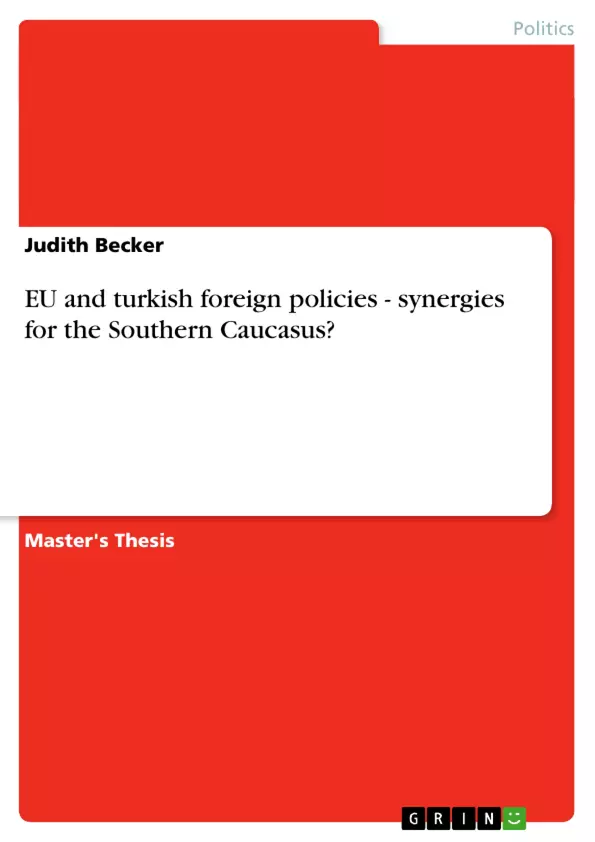Even though the accession negotiations between the EU and Turkey are projected to last at least another ten to fifteen years, or in the worst case even twenty years, Turkey could become an important member state for the EU and an asset to its foreign policy . For this to happen, the foreign policies of the EU and Turkey will have to be supplementary, even and especially now in the phase of negotiations. Thus, the relationships between Turkey, on the one hand, and Georgia, Armenia and Azerbaijan, on the other hand, have to be friendly to be an asset for the EU. However, the European Neighbourhood Policy (ENP) and enlargement, especially with regard to Turkey, are mainly researched separately, because they are two distinctive EU policies. Are the interests and aims of the EU and Turkey in their relations to the countries of the Southern Caucasus compatible and can they lead to synergies?
Inhaltsverzeichnis (Table of Contents)
- Introduction
- The EU's Foreign Policy and Turkish Foreign Policy
- EU Foreign Policy
- Turkish Foreign Policy
- The European Neighbourhood Policy
- The Southern Caucasus
- Republic of Armenia
- Republic of Azerbaijan
- Georgia
- Possible Synergies between the EU and Turkey in the Southern Caucasus
Zielsetzung und Themenschwerpunkte (Objectives and Key Themes)
This essay examines the potential for synergy between the EU's foreign policy and Turkey's foreign policy in the context of the Southern Caucasus. It investigates the historical relationship between the EU and Turkey, particularly in the context of Turkish membership aspirations and the EU's enlargement strategy. It also explores the implications of the European Neighbourhood Policy (ENP) for the Southern Caucasus region.
- EU's foreign policy objectives and instruments
- Turkey's foreign policy goals and its relationship with the EU
- The EU's enlargement strategy and its impact on Turkey's accession process
- The European Neighbourhood Policy and its implications for the Southern Caucasus countries
- Potential for cooperation and synergy between the EU and Turkey in the Southern Caucasus
Zusammenfassung der Kapitel (Chapter Summaries)
- Introduction: This chapter provides an overview of the EU's foreign policy aspirations and its evolving role as a global actor since the end of the Cold War. It highlights the key instruments of EU foreign policy, including the Common Foreign and Security Policy (CFSP), the European Security and Defence Policy (ESDP), and the European Neighbourhood Policy (ENP). It also discusses the significance of the EU's successive enlargements, particularly in Central and Eastern Europe, and the challenges they have posed.
- The EU's Foreign Policy and Turkish Foreign Policy: This chapter delves into the foreign policy of the EU and Turkey, examining their historical trajectories, key objectives, and main instruments. It highlights the similarities and differences in their approaches to foreign policy, as well as the challenges and opportunities presented by their respective relationships with other actors in the international system.
- The European Neighbourhood Policy: This chapter provides a detailed account of the ENP, its origins, goals, and implementation mechanisms. It discusses the role of the ENP in promoting stability, security, and economic development in the EU's immediate neighborhood, particularly in the context of the EU's enlargement strategy.
- The Southern Caucasus: This chapter examines the individual countries of the Southern Caucasus region – Armenia, Azerbaijan, and Georgia – focusing on their geopolitical significance, historical background, and current political and economic situations. It explores the challenges and opportunities presented by their respective relationships with the EU and Turkey, as well as the potential for greater cooperation in the region.
Schlüsselwörter (Keywords)
The key words and focus topics of this essay are European Union (EU), Turkish Foreign Policy, European Neighbourhood Policy (ENP), Southern Caucasus, Armenia, Azerbaijan, Georgia, enlargement, accession, cooperation, synergy, and regional stability.
Frequently Asked Questions
Can EU and Turkish foreign policies create synergies?
Yes, if their policies are supplementary, they can enhance stability and influence in regions like the Southern Caucasus, despite ongoing accession negotiations.
What is the European Neighbourhood Policy (ENP)?
The ENP is an EU strategy aimed at fostering stability, security, and prosperity in countries neighboring the EU (like Georgia, Armenia, and Azerbaijan) without offering immediate membership.
Why is the Southern Caucasus strategically important?
The region (Armenia, Azerbaijan, Georgia) is a vital energy corridor and a geopolitical crossroads between Europe, Russia, and the Middle East.
How does Turkey's role affect the EU's enlargement strategy?
Turkey acts as a bridge to the East. A friendly relationship between Turkey and the Caucasus states is a significant asset for the EU's broader foreign policy goals.
What are the main instruments of EU foreign policy?
The primary instruments include the Common Foreign and Security Policy (CFSP), the European Security and Defence Policy (ESDP), and the ENP.
- Quote paper
- MA Judith Becker (Author), 2007, EU and turkish foreign policies - synergies for the Southern Caucasus?, Munich, GRIN Verlag, https://www.grin.com/document/86011



